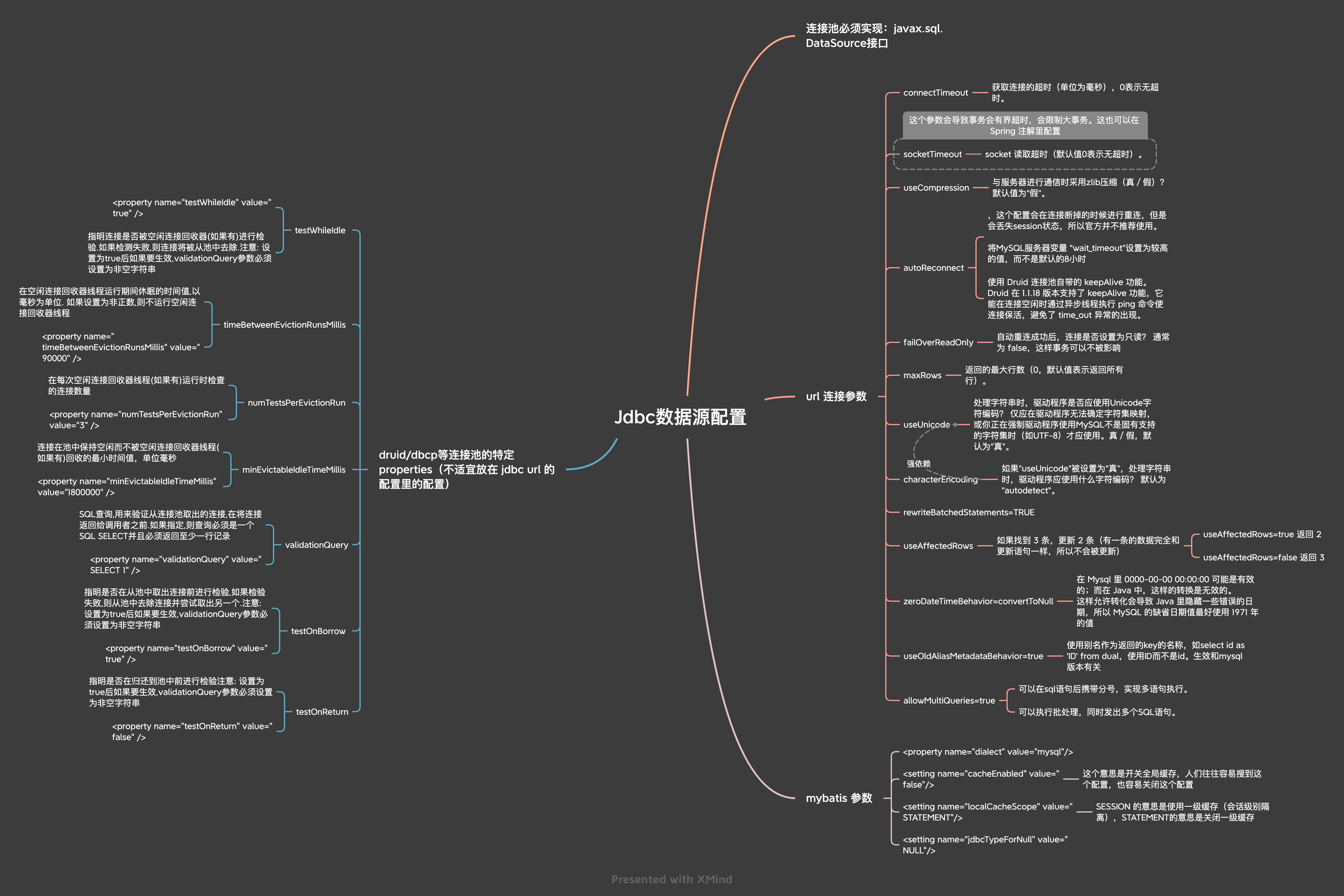如何创建 SqlSession
org.apache.ibatis.session.defaults.DefaultSqlSessionFactory
1
2
3
4
5
6
7
8
9
10
11
12
13
14
15
16
17
18
19
20
21
22
23
24
25
26
27
28
|
SqlSession sqlSession = sqlSessionFactory.openSession(true);
@Override
public SqlSession openSession(boolean autoCommit) {
return openSessionFromDataSource(configuration.getDefaultExecutorType(), null, autoCommit);
}
private SqlSession openSessionFromDataSource(ExecutorType execType, TransactionIsolationLevel level, boolean autoCommit) {
Transaction tx = null;
try {
final Environment environment = configuration.getEnvironment();
final TransactionFactory transactionFactory = getTransactionFactoryFromEnvironment(environment);
tx = transactionFactory.newTransaction(environment.getDataSource(), level, autoCommit);
final Executor executor = configuration.newExecutor(tx, execType);
return new DefaultSqlSession(configuration, executor, autoCommit);
} catch (Exception e) {
closeTransaction(tx);
throw ExceptionFactory.wrapException("Error opening session. Cause: " + e, e);
} finally {
ErrorContext.instance().reset();
}
}
|
缓存问题
参考《深入浅出mybatis之缓存机制》。
xml 配置
1
2
3
4
5
6
7
8
9
10
11
12
13
14
15
16
17
18
19
20
21
22
23
24
25
26
27
28
29
30
31
32
33
34
|
<setting name="cacheEnabled" value="true" />
<setting name="localCacheScope" value="SESSION" />
## 如何创建执行器
`org.apache.ibatis.session.Configuration`
```java
// 在Configuration中根据不同的defaultExecutorType参数值装配具体的Executor实现
public Executor newExecutor(Transaction transaction, ExecutorType executorType) {
// 这里的双行 executorType 赋值很有意思
executorType = executorType == null ? defaultExecutorType : executorType;
executorType = executorType == null ? ExecutorType.SIMPLE : executorType;
// 这里使用了简单工厂方法模式,值得注意的是 Executor 本身知道自己的 wrapper 和 delegate 对象之间的相互引用
// 根据不同的defaultExecutorType参数值装配具体的Executor实现
Executor executor;
if (ExecutorType.BATCH == executorType) {
// 当defaultExecutorType值为BATCH时,使用BatchExecutor
executor = new BatchExecutor(this, transaction);
} else if (ExecutorType.REUSE == executorType) {
// 当defaultExecutorType值为REUSE时,使用ReuseExecutor
executor = new ReuseExecutor(this, transaction);
} else {
// 默认情况下使用SimpleExecutor
executor = new SimpleExecutor(this, transaction);
}
// 如果设置cacheEnabled参数值为true,将使用CachingExecutor,这是第一个参数的重要特性!
if (cacheEnabled) {
executor = new CachingExecutor(executor);
}
executor = (Executor) interceptorChain.pluginAll(executor);
return executor;
}
|
org.apache.ibatis.executor.BaseExecutor
1
2
3
4
5
6
7
8
9
10
11
12
13
14
15
16
17
18
19
20
21
22
23
24
25
26
27
28
29
30
31
32
33
34
35
36
37
38
39
40
41
42
43
44
45
46
47
48
49
50
51
52
53
54
55
56
57
58
59
60
| @SuppressWarnings("unchecked")
@Override
public <E> List<E> query(MappedStatement ms, Object parameter, RowBounds rowBounds, ResultHandler resultHandler, CacheKey key, BoundSql boundSql) throws SQLException {
ErrorContext.instance().resource(ms.getResource()).activity("executing a query").object(ms.getId());
if (closed) {
throw new ExecutorException("Executor was closed.");
}
if (queryStack == 0 && ms.isFlushCacheRequired()) {
clearLocalCache();
}
List<E> list;
try {
queryStack++;
list = resultHandler == null ? (List<E>) localCache.getObject(key) : null;
if (list != null) {
handleLocallyCachedOutputParameters(ms, key, parameter, boundSql);
} else {
list = queryFromDatabase(ms, parameter, rowBounds, resultHandler, key, boundSql);
}
} finally {
queryStack--;
}
if (queryStack == 0) {
for (BaseExecutor.DeferredLoad deferredLoad : deferredLoads) {
deferredLoad.load();
}
deferredLoads.clear();
if (configuration.getLocalCacheScope() == LocalCacheScope.STATEMENT) {
clearLocalCache();
}
}
return list;
}
private <E> List<E> queryFromDatabase(MappedStatement ms, Object parameter, RowBounds rowBounds, ResultHandler resultHandler, CacheKey key, BoundSql boundSql) throws SQLException {
List<E> list;
localCache.putObject(key, EXECUTION_PLACEHOLDER);
try {
list = doQuery(ms, parameter, rowBounds, resultHandler, boundSql);
} finally {
localCache.removeObject(key);
}
localCache.putObject(key, list);
if (ms.getStatementType() == StatementType.CALLABLE) {
localOutputParameterCache.putObject(key, parameter);
}
return list;
}
protected abstract <E> List<E> doQuery(MappedStatement ms, Object parameter, RowBounds rowBounds, ResultHandler resultHandler, BoundSql boundSql)
throws SQLException;
|
- 参数cacheEnabled控制MyBatis使用的执行器类型,cacheEnabled 为 false 使用 BaseExecutor,里面一样有一个 localCache。
- 参数localCacheScope控制的是BaseExecutor内部的缓存策略,确定 localCache 是否真的要被使用-它可以优化同一个 session 内的重复查询。
org.apache.ibatis.cache.CacheKey
1
2
3
4
5
6
7
8
9
10
11
12
13
14
15
16
17
18
19
20
21
22
23
24
25
26
27
28
29
30
31
32
33
34
35
36
37
38
39
40
41
42
43
44
45
46
47
48
49
50
51
52
53
54
55
56
57
58
59
60
61
62
63
64
65
66
67
68
69
70
71
72
73
74
75
76
77
78
79
80
81
82
83
84
85
86
87
88
89
90
91
92
93
94
95
96
97
98
99
100
101
| public class CacheKey implements Cloneable, Serializable {
private final int multiplier;
private int hashcode;
private long checksum;
private int count;
private transient List<Object> updateList;
@Override
public int hashCode() {
return hashcode;
}
@Override
public boolean equals(Object object) {
if (this == object) {
return true;
}
if (!(object instanceof CacheKey)) {
return false;
}
final CacheKey cacheKey = (CacheKey) object;
if (hashcode != cacheKey.hashcode) {
return false;
}
if (checksum != cacheKey.checksum) {
return false;
}
if (count != cacheKey.count) {
return false;
}
for (int i = 0; i < updateList.size(); i++) {
Object thisObject = updateList.get(i);
Object thatObject = cacheKey.updateList.get(i);
if (!ArrayUtil.equals(thisObject, thatObject)) {
return false;
}
}
return true;
}
}
@Override
public <E> List<E> query(MappedStatement ms, Object parameter, RowBounds rowBounds, ResultHandler resultHandler) throws SQLException {
BoundSql boundSql = ms.getBoundSql(parameter);
CacheKey key = createCacheKey(ms, parameter, rowBounds, boundSql);
return query(ms, parameter, rowBounds, resultHandler, key, boundSql);
}
@Override
public CacheKey createCacheKey(MappedStatement ms, Object parameterObject, RowBounds rowBounds, BoundSql boundSql) {
if (closed) {
throw new ExecutorException("Executor was closed.");
}
CacheKey cacheKey = new CacheKey();
cacheKey.update(ms.getId());
cacheKey.update(rowBounds.getOffset());
cacheKey.update(rowBounds.getLimit());
cacheKey.update(boundSql.getSql());
List<ParameterMapping> parameterMappings = boundSql.getParameterMappings();
TypeHandlerRegistry typeHandlerRegistry = ms.getConfiguration().getTypeHandlerRegistry();
for (ParameterMapping parameterMapping : parameterMappings) {
if (parameterMapping.getMode() != ParameterMode.OUT) {
Object value;
String propertyName = parameterMapping.getProperty();
if (boundSql.hasAdditionalParameter(propertyName)) {
value = boundSql.getAdditionalParameter(propertyName);
} else if (parameterObject == null) {
value = null;
} else if (typeHandlerRegistry.hasTypeHandler(parameterObject.getClass())) {
value = parameterObject;
} else {
MetaObject metaObject = configuration.newMetaObject(parameterObject);
value = metaObject.getValue(propertyName);
}
cacheKey.update(value);
}
}
if (configuration.getEnvironment() != null) {
cacheKey.update(configuration.getEnvironment().getId());
}
return cacheKey;
}
|
org.apache.ibatis.executor.CachingExecutor
1
2
3
4
5
6
7
8
9
10
11
12
13
14
15
16
17
18
19
20
21
22
23
24
25
26
27
28
29
30
31
32
33
|
private final Executor delegate;
private final TransactionalCacheManager tcm = new TransactionalCacheManager();
public CachingExecutor(Executor delegate) {
this.delegate = delegate;
delegate.setExecutorWrapper(this);
}
@Override
public <E> List<E> query(MappedStatement ms, Object parameterObject, RowBounds rowBounds, ResultHandler resultHandler, CacheKey key, BoundSql boundSql)
throws SQLException {
Cache cache = ms.getCache();
if (cache != null) {
flushCacheIfRequired(ms);
if (ms.isUseCache() && resultHandler == null) {
ensureNoOutParams(ms, parameterObject, boundSql);
@SuppressWarnings("unchecked")
List<E> list = (List<E>) tcm.getObject(cache, key);
if (list == null) {
list = delegate.<E> query(ms, parameterObject, rowBounds, resultHandler, key, boundSql);
tcm.putObject(cache, key, list);
}
return list;
}
}
return delegate.<E> query(ms, parameterObject, rowBounds, resultHandler, key, boundSql);
}
|
- localCacheScope 控制的是一级缓存的配置,这是一个经常忘记被关闭的缓存的配置。
- cacheEnabled 控制的是二级缓存的配置,人们往往记得关闭它。
- 这两个缓存可以被同时激活。





